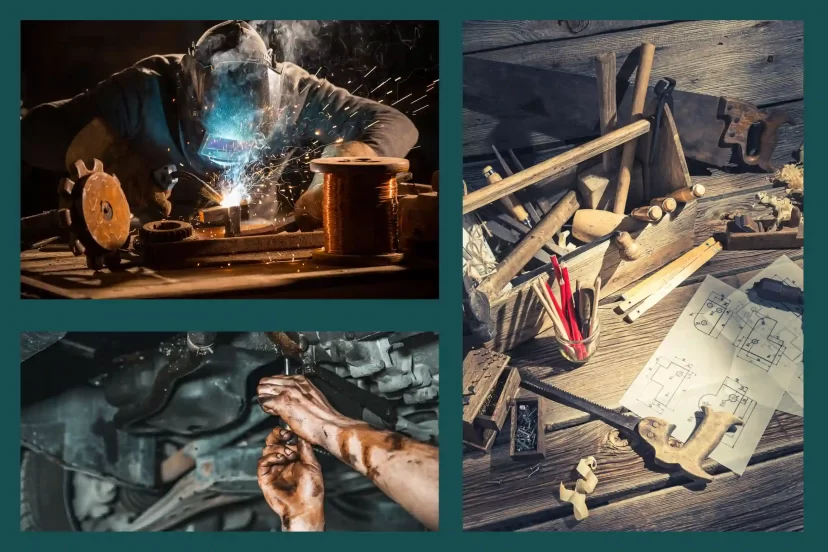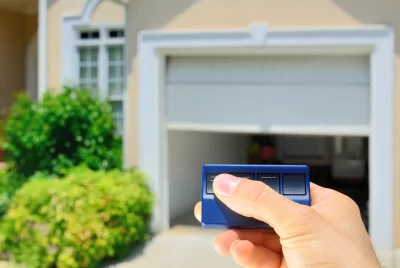Efficient and Smart: Plan Your Perfect Garage Workshop
I find that working with my hands is incredibly therapeutic and provides an outlet for stress relief. Having a dedicated space to work on projects has many benefits that make the investment in setting one up quite worthwhile.
I’ve built and repaired many things for our house over the years and never regretted ousting my car from the garage just so I can have that space all to myself. Well… me and our storage shelving…and the pantry cabinet. I guess you can tell that our garage is a bit of a compromise. But that’s the beauty, it doesn’t have to be one thing, you just have to be strategic about it.
At the end of the day, creating an effective garage workshop is all about you finding what works best for you.
Table of Contents
- Designing Your Garage Workshop
- Assessing Your Space and Layout Options
- Electrical
- Flooring
- Epoxy Coatings
- Interlocking Tiles
- Rubber Mats
- Safety
- Lighting Up The Room
- Selecting Appropriate Storage Solutions
- Essential Tools for Your Garage Workshop
- Power Tools
- Hand Tools
- Mechanic’s Tools
- Air Compressor and Air Tools
- Specialty Tools
- Safety Measures
- Proper Ventilation and Air Quality Control
- Protective Gear: Gloves, Safety Glasses, Earplugs
- Fire Prevention Measures
- Creating a Productive Workspace
- Organizing Your Tools and Materials
- Setting up Workbenches and Assembly Areas
- Incorporating Technology into Your Workspace
- Adding Personal Touches to Your Garage Workshop
- Decorating with Artwork or Memorabilia
- Customizing Storage Solutions to Fit Your Needs
- Creating a Comfortable Work Environment
- Frequently Asked Questions (FAQs)
1) Designing Your Garage Workshop
Assessing Your Space and Layout Options
Before you start setting up your garage workshop, take a good look at your space and assess all the possible layout options. This includes measuring the area where you plan to set up your workbench or assembly area, and any shelving or cabinets.
When assessing your space you’ll need to know whether or not you want to use your entire garage as a workshop or if you want to allocate only a portion of it for that purpose. Like most people, the garage is usually a multifunction space. Its typically shared with bikes, gardening tools, household storage, etc.
Next, think about what types of projects you plan on working on most often. Will you be doing woodworking or arts and crafts? Auto repair? Metal fabrication? Make sure your workspace is designed with those projects in mind so that everything is set up efficiently.
Now, decide where your main working zones are going to be so you can incorporate some good lighting, new electrical outlets and possibly dust control or air lines to a compressor. To help you visualize the workshop, sketch out a rough layout of your plan to ensure that everything fits together seamlessly.
Pro-Tip: Don’t forget to mark the location of windows, doors and current electrical outlets that may affect how you position your equipment.
You’ll want to have an idea of which mobile or stationary power tools you may need floorspace for, like a table saw or drill press or maybe even a car lift!
Give some thought to safety measures like proper ventilation when working with solvents and chemicals. Then there’s fire prevention equipment like a fire extinguisher that should be standard.
Electrical
You’ll need plenty of outlets for power tools and other equipment, so plan accordingly. It’s always better to have too many outlets than not enough!
A good idea is to hire an electrician to help with any wiring needs or upgrades that may be required for your space. This can include installing new circuits or upgrading your electrical panel if necessary.
Ensure that all wiring and outlets are up to code and safe for use in a workshop setting. Don’t skimp on safety when it comes to electrical work – it’s not worth the risk!
Flooring
Epoxy Coatings
This coating is applied directly onto the concrete floor and create a tough, seamless surface that is easy to clean. They also come in a variety of colors and textures, so you can customize the look of your garage workshop.
Epoxy coatings offer excellent durability against chemicals, stains, and heavy traffic but they require careful preparation before installation. The concrete surface must be thoroughly cleaned before application and any cracks or holes will need to be filled prior to coating.
Interlocking tiles
These tiles are made from materials like PVC or rubber and can be easily snapped together over your existing concrete floor.
One advantage of using interlocking tiles is that they can be replaced individually if they become damaged or stained. They also come in a variety of colors and patterns so you can personalize the look of your space.
Interlocking tiles offer excellent flexibility in design but may not provide as much resistance against heavy loads compared with epoxy coatings. They might also not have as long of a life span.
Rubber mats
They are cheap and easy to clean and provide good traction for working on cars or other equipment. They are not as durable as the other options. Nor will they provide as much protection against spills and chemicals.
Lighting Up The Room
Bright overhead lighting is a must. Install a few well positioned energy-efficient and long-lasting LED lights that imitate the diffuse lighting of florescent tubes. They will give off a nice soft even light. This makes it easier to see your work and helps reduce eye strain and fatigue..
You might also want a few areas with more concentrated lighting. Like an articulating desk lamp, or LED magnifying glass.
Selecting Appropriate Storage Solutions
Most garage workshops usually have limited space so wall-mounted shelves and cabinets are usually an easy way to add storage without taking up valuable floor space. You can also install pegboards or slatwalls which allow you to hang tools and equipment within easy reach.
For larger items like power tools or gardening equipment, consider investing in cabinets with doors or drawers that can be locked for added security. Rolling tool chests are another great option since they can be moved around as needed and provide plenty of storage space for all your tools.
2) Essential Tools for Your Garage Workshop Plan
Power Tools
When it comes to power tools, the possibilities are endless. A good drill is essential, of course, whether you’re hanging shelves or building a birdhouse. A circular saw can make quick work of cutting lumber, while a jigsaw is perfect for creating intricate shapes. Sanders are also useful for smoothing out rough edges and surfaces.
Consider investing in cordless power tools if you want to work without the constraint of a power outlet.
Hand Tools
Hand tools may seem old-fashioned compared to their electric counterparts, but they remain essential in any workshop arsenal. a hammer, various screwdrivers, handsaw, and a few wrenches of different sizes.
Don’t underestimate the usefulness of pliers, wire cutters, and utility knives as well. They may not be as glamorous as some other tools but can be invaluable in certain situations.
Mechanic’s Tools
If you plan on working on vehicles, you’ll need a comprehensive set of mechanic’s tools. These include sockets and ratchets in various sizes, wrenches (including torque wrenches), pliers (including locking pliers), screwdrivers (including precision screwdrivers), and more. Brands such as Snap-On or Matco offer high-quality mechanic’s tool sets that are worth the investment.
Air Compressor and Air Tools
An air compressor powers a variety of air tools such as impact wrenches, nail guns, sanders, paint sprayers, and more. When choosing an air compressor look at its horsepower rating – the higher the horsepower rating the faster it will fill up your tanks – as well as its overall size and portability.
Specialty Tools
Specialty tools are often more expensive and more specialized to a certain task. They can be worth the investment if you plan on tackling unique projects. A welder or Plasma cutter for instance, if you plan on working with metal or aluminium regularly.
Specialty tools require specific knowledge and training before using properly and safely. Overall, having a variety of different types of garage workshop equipment will allow you to tackle any project with ease and efficiency.
Take your time researching what will best suit your needs so that you don’t waste money on equipment you won’t use. Always follow safety instructions when operating any type of tool and invest in high-quality protective gear, so you can work without worrying about injuries.
3) Safety Measures
Proper Ventilation and Air Quality Control
When setting up your garage workshop, proper ventilation and air quality control should be part of the plan. Many power tools generate dust and sometime some fumes from the materials being worked on. That can be hazardous to your health if inhaled regularly.
One way to improve air quality is by installing a ventilation system that will circulate fresh air into the space. This can be achieved by adding vents or a fan system to your garage, or simply by opening windows and garage doors when working on projects. Of course opening doors or windows may not be suitable if you are in the middle of winter!
Use of filters in your ventilation system. These filters will help capture any dust or debris that may become airborne during projects, keeping it from circulating throughout the workshop. Regularly clean these filters to ensure they are functioning correctly.
For woodworking, a dust collection system will also get rid of most wood dust before they have a chance of getting out into the open.
Its good practice to always clean your workshop area after you’ve finished for the day. This keeps dust and dirt from spreading further than your shop.
Protective Gear: Gloves, Safety Glasses, Earplugs
Wearing appropriate protective gear while working in your garage workshop can prevent many accidents and injuries from occurring. Gloves protect hands from splinters and cuts caused by sharp tools or materials.
Safety glasses are another critical piece of protective gear as they shield eyes from flying debris generated by saws or drills or even hammering a nail. They come in different styles depending on specific needs like tinted lenses for outdoor work or prescription safety glasses for those with vision impairment.
You’ll want earplugs when using power tools that produce high decibels since prolonged exposure can cause hearing loss over time. Always wear earplugs even if you don’t think it’s noisy enough because many power tools continue to produce harmful sounds even when operating at low sounds.
Fire Prevention Measures
A fire breakout in the workshop could lead to disastrous consequences; therefore, implementing fire prevention measures is vital when designing a garage workshop plan. Installing smoke detectors throughout the workspace can alert you in case of any fire-related emergencies. The smoke detectors should be checked frequently to ensure they are functioning and have sufficient batteries.
You should have fire extinguishers placed at strategic positions for convenience in case of any emergency. Moreover, ensuring that power cords aren’t frayed or damaged and unplugging tools when not in use can prevent electrical fires from occurring.
If you have cars in your shop area at anytime, then it’s a good idea to also install a carbon monoxide detector. Investing time and effort upfront will go a long way towards keeping you safe while working on your DIY projects.
4) Creating a Productive Workspace
Organizing Your Tools and Materials
When designing your garage workshop plan, think of where you want to keep your tools and materials organized. This will not only help you work more efficiently but also ensure that you can find what you need quickly. Start by sorting your tools by type and frequency of use.
Keep commonly used items within easy reach and store the rest in cabinets or drawers. Investing in storage solutions such as pegboards, toolboxes, and shelves can also be helpful.
Pegboards allow for easy access to frequently used tools while shelves can be used to store smaller items like screws or nails, consider using plastic bins with labels so everything is easy to find.
Setting up Workbenches and Assembly Areas
Decide where you want your main workspace(s) so you can reserve ample room around it for you and the work pieces you need to bring to that space. Make sure you think about how close your tools and material storage are from your main workspace so you aren’t caught going around obstacles or tripping on cords when trying to access them.
Have a sturdy heavy workbench that provides ample space for the projects you intend to pursue. Ensure that it’s stable and flat to the ground. That it doesn’t bounce when hammering or slide when to trying place a large item on it by yourself. Your quality of workmanship will also be much improved this way.
Consider adding built-in drawers or cabinets beneath the workbench to store larger power tools when not in use. Rolling cabinets are also great for storage and as an extra work surface when you need it.
Setting up an assembly area can also be beneficial. This area should have enough space for large projects and equipment such as table saws or drill presses. Make sure there is enough clearance around these machines for safe operation and positioning of materials.
Incorporating Technology into Your Workspace
Technology has become part of many modern workshops by adding features such as smart lighting systems or wireless speakers.They help make your workspace more enjoyable.
A computer with internet access can also be useful for researching new projects or looking up tool manuals online. Some modern power tools even come with digital displays or apps that allow you to adjust settings on the fly.
As technology continues to advance, there are endless possibilities for incorporating it into your workspace. Just make sure any technology added enhances productivity without becoming a distraction during critical tasks.
5) Adding Personal Touches to Your Garage Workshop
Decorating with artwork or memorabilia
One of the best things about having your own garage workshop is that you can plan and decorate it any way you like! Adding personal touches to your space can make it feel more like home, inspire creativity, and boost productivity.
Perhaps hang artwork or posters on the walls that motivate you or showcase your interests. You can also include memorabilia from your favorite hobbies or projects.
If you are a car enthusiast, display vintage license plates on the wall or showcase model cars on shelves. If woodworking is your passion, show off some of your completed projects in the workspace.
Customizing storage solutions to fit your needs
Every garage workshop is different and requires unique storage solutions based on the types of tools and equipment being used. Customizing storage solutions to fit your needs can help increase efficiency and productivity in your workspace.
Creating a comfortable work environment
Since you will be spending a lot of time in your garage workshop, plan to make it a comfortable work environment for yourself. Add insulation or a a mini-split AC system if necessary so that the temperature remains consistent throughout the year. Insulation also keeps unwanted noise from bothering your neighbors should you need to work later into the evening.
Add some plants or greenery to improve air quality and make the space feel more inviting.
Invest in a comfortable chair or stool so that you are able to work for longer periods of time without experiencing discomfort. Creating a comfortable and welcoming workspace will help you stay motivated and productive.
6) FAQs
- How can I optimize the electrical setup in my garage workshop plan?
Consider hiring a professional electrician to assess your electrical system and ensure it can handle the load. Install sufficient electrical outlets strategically throughout the space and consider using surge protectors to safeguard your equipment. - What are some space-saving ideas for a small garage workshop?
If you have a small garage space, there are several space-saving ideas you can implement. Utilize wall-mounted storage solutions, such as magnetic tool holders or hanging baskets, to free up floor space. Use foldable workbenches or work surfaces that can be easily stowed away when not in use. Compact and multi-functional tools can also help save space. - How can I improve the soundproofing in my garage workshop?
If you want to minimize noise disturbances from your garage workshop, install insulation in the walls and ceiling to absorb sound vibrations. Seal any gaps or cracks that may allow sound to escape. Additionally, consider using acoustic panels or soundproof curtains to further dampen noise within the space. - Are there any eco-friendly practices I can adopt when I plan my garage workshop?
Yes, there are several eco-friendly practices you can adopt in your garage workshop. Opt for energy-efficient lighting options like LED bulbs. Properly dispose of hazardous materials and recycle whenever possible. Consider using environmentally friendly products, such as low VOC paints or eco-friendly solvents. Conserving water and practicing efficient energy use can also contribute to a greener workshop. - How can I maintain a clean and organized garage workshop?
Implement a regular cleaning schedule to keep the space clutter-free. Label storage containers and maintain a systematic arrangement for tools and materials. Consider investing in a dust collection system to minimize airborne dust and debris. Regularly inspect and maintain equipment to ensure optimal performance and longevity.




